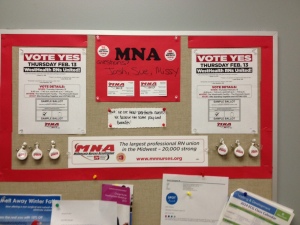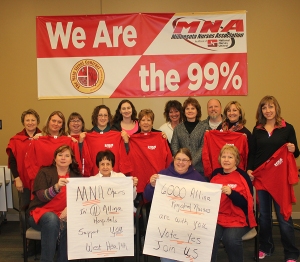Poverty has a Woman’s Face
According to the summary of a report by the Center on Women and Public Policy and the Women’s Foundation of Minnesota says that “at the current rate, the pay gap in Minnesota will not be closed until 2060.” That’s right. Men will still make more than women for the same job and the same work 140 years after Womens Suffrage, almost 90 years after a human landed on the moon, and about the same time Hailey’s Comet returns in its next 76-year-orbit.
As women succeed, the state succeeds. How to accomplish that is spurred by the Womens Security Act-a legislative package of 17 ideas that are being championed by Rep. Paul Thissen. The Speaker of the Minnesota House outlined the proposals at the 2014 Womens Economic Security Summit. Some of these ideas affect the prosperity of all Minnesotans but through lapses in public policy they affect women more-the minimum wage is the most visible. As women predominantly hold service and caregiver occupations, including nursing, they are held down as a whole when wages and salaries don’t keep up.
From a purely economic perspective, the dimunuitive female economy makes the state economy smaller as well. As a recent Time magazine report said, the more money women make, the more money they manage-their own and their household’s. That affects spending exponentially as well as 58 cents of every online dollar is spent by a woman. 80 cents of every healthcare dollar is spent by a woman. Even 44 cents of every dollar spent on National League Football games and gear is spent by a woman.
It’s not just an issue of equality or justice. It’s an issue of prosperity and growth. Thissen and the House majority have made this package of policies a priority. Minnesota should too.
A Summary:
Closing the gender pay gap through requiring vendors with the state to report on pay equity.
Increasing income for working women and families by raising the minimum wage to $9.50.
Expanding access to high-quality, affordable childcare by removing the cap on early learning scholarships and increasing child care provider reimbursement.
Expanding family and sick leave for working families by increasing unpaid family leave from 6 to 12 weeks.
Protecting women from discrimination in the workplace by preventing discrimination towards women with c
hildren or who are pregnant.
Enhancing protections for victims of domestic violence by including women who are victims of stalking and sexual assault for insurance eligibility.
Helping women-owned small business succeed.
Helping older women be economically secure.
Encouraging women in non-traditional, high-wage jobs.
Just by the numbers, women make up half of Minnesota’s workforce, but they are two-thirds of all minimum-wage earners and 58 percent of those who make less than $9.50. If half of Minnesotans are being kept from earning more, the state is depriving itself of the wealth and success it needs and deserves.
The full platform is here: http://mnwomen.org/dev/wp-content/uploads/2012/11/2013-MWC-Legislative-Platform.pdf
Town Hall: Pittsburgh
PSNA and PSNA District 2 will hold a Town Hall meeting on March 20, 2014 from 6 pm – 8 pm at the University of Pittsburgh School of Nursing. Stay tuned for additional information as we near this event. Click here for details.
What is Genomics? How Does Genomic Science Apply to Nursing Practice?
What is Genomics? How Does Genomic Science Apply to Nursing Practice
Free Webinar: Making the Business Case for Safe Patient Handling
10 Reasons to Oppose the Keystone XL Pipeline
With the clock ticking down on a final decision by the Obama administration on Keystone XL, it’s time to update why NNU is opposed to a project that looks more like a pathway to pollution than a gateway to our gas pumps.
Citing the threat to public health and how the project would hasten the climate crisis, nurses have been on the front line of protests against Keystone, a 1,700-mile pipeline that would transport 830,000 barrels of dirty tar sands oil every day from Alberta, Canada to U.S. Gulf Coast refineries, largely for export.
Here’s 10 reasons why:
1. No jobs on a dead planet
More jobs are certainly needed, but even the just concluded State Department assessment conceded Keystone would support only 35 post-construction jobs.
Infrastructure repair and promoting a green economy is a far better solution for the jobs crisis than a project that NASA scientist and climate expert James Hanson famously calls “game over” on the climate front.
If the threshold issue is jobs, nurses should support the pipeline as a full employment act in the volume of additional patients sickened by the pipeline’s health hazards and toll from accelerated climate change. But nurses see an inseparable link between environmental justice and the health of our communities and planet.
2. Don’t drink the water…
From the ground to the pipe to the refineries, Keystone’s tar sands oil, with its thick, dirty, corrosive properties, pose a far greater hazard than conventional oil – a major reason for National Nurses United and nurse opposition.
Toxic contaminants in the massive water needed for extraction are infecting clean water supplies with towns nearby Alberta experiencing spikes in cancer deaths, renal failure, lupus, and hyperthyroidism. Huge pipeline spills near Marshall, Mi. and Mayflower, Ar. have led to respiratory ailments and other health ills. Pollutants from tar sands refineries are linked to heart and lung disease, asthma, and cancer.
3. …And don’t breathe the air
Mounds of Petcoke, the carbon residue of tar sands refining, piled up for export for burning, have produced toxic dust storms that have left area residents gasping near Detroit, Chicago, and other locales.
Canadian scientists are also alarmed at mercury “wafting” into the air from tar sands production which, in chronic exposure, have been linked to brain damage.
4. An asthma nation
Nurses see an explosion of asthma sufferers, especially children. More than 40 percent of Americans now live in areas slammed by air pollution with levels of particle pollution that can also cause higher incidents of heart attacks and premature death.
Keystone will multiply carbon emissions and speed up climate change resulting in more polluted air, higher air temperatures which can also increase bacteria-related food poisoning, such as salmonella, and animal-borne diseases such as West Nile virus.
5. The gathering storms
In the last year alone, we’ve seen the worst cyclone ever to hit landfall, fueled by sub-surface ocean temperatures 9 degrees above normal, the largest recorded tornado ever recorded, record droughts, and other unprecedented weather anomalies. While some discount the link to climate change, there’s no dispute that the past decade was the hottest on record.
Nurses, as NNU’s RNRN volunteers can attest, treat the human collateral damage, thousands of patients affected by Typhoon Haiyan/Yolanda in the Philippines, for example, who endured life threatening injuries and loss of their homes and livelihoods.
6. The carbon bomb
All workers and their families live in the same communities affected by the climate crisis and the pipeline health hazards. Despite naysayers who insist there is no environmental justification to block it, there is as much scientific consensus on Keystone as there is on the human hand behind the climate crisis, or the factual evidence of evolution.
In addition to Hanson, who calls Keystone “the biggest carbon bomb on the planet,” dozens of other prominent scientists signed a 2013 letter stating “the actual and potential environmental damage (are) sufficiently severe to reject Keystone to protect the climate, human health, and the multiple ecosystems this project threatens.”
In simple terms, Keystone would generate the carbon emission equivalent of 40 million more cars or 50 coal-fired power plants every year.
7. Not headed to your gas pump
Contrary to the myth, Keystone would contribute little to U.S. energy independence. The oil is headed to Texas ports for a reason – to be shipped overseas. TransCanada, the corporation behind Keystone, balked at a Congressional proposal to condition approval on keeping the refined oil in the U.S., and reports say TransCanada already has contracts to sell much of the oil to foreign buyers.
8. Pipeline or bust for the tar sands industry
Proponents insist that if Keystone is blocked, the tar sands crude will just be shipped by rail. Many disagree, among them a pro-pipeline Canadian think tank that predicts without Keystone, “investment and expansion will grind to a halt,” a view shared by the International Energy Agency, Goldman Sachs and some oil executives. Increasingly, it appears, the pipeline is the linchpin for tar sands development.
9. Which side are you on?
In one corner, the American Petroleum Institute, the oil billionaire Koch Brothers, other fossil fuel giants, the far right American Legislative Exchange Council (ALEC), and politicians they influence – the same folks behind the attacks on unions, worker rights and health care and social justice reforms.
Standing with NNU in opposition are every major environmental group, farmers, ranchers and community leaders along the pipeline pathway, First Nations leaders, many clergy, most Canadian unions, and U.S. transit unions.
10. A last word, from Robert Redford
“The more people learn about the Keystone XL tar sands pipeline, the less they like it,” says actor/environmentalist Redford. “Tar sands crude means a dirtier, more dangerous future for our children all so that the oil industry can reach the higher prices of overseas markets. This dirty energy project is all risk and no reward for the American people.”
Originally appeared in Common Dreams
Nurses at Abbott Northwestern-Westhealth Vote for Union Representation with Minnesota Nurses Association
(St. Paul, MN – Feb. 14, 2014) 32 registered nurses at Abbott Northwestern Westhealth Emergency Department and Urgent Care on Thursday overwhelmingly voted for a voice at work through contract representation by the Minnesota Nurses Association (MNA). In a secret ballot election, conducted by the National Labor Relations Board, nurses voted by 92% to join MNA.
Many of the nurses at the new stand-alone emergency/urgent care unit located in the Twin Cities suburb of Plymouth have worked at other MNA contract facilities and were eager for the same opportunity to have a voice in their workplace to be able to advocate for themselves and their patients. “Not only do patients deserve the same quality of nursing care and skill that Abbott Northwestern offers, it is equally important that we as nurses are treated the same,” said nurse activist Missy Lu.
The facility opened in December 2012 and within eleven months, its nurses contacted MNA to initiate an organizing campaign. With strong leadership and a knowledgeable nurse group, organizing swiftly moved to filing a Petition for Representation Election with the National Labor Relations Board on Jan. 24. The successful vote culminated a determined effort by nurses, some of whom had never enjoyed the benefits of a contract. “We are united as one with our fellow ANW nurses and will stand strong together for equality,” said Lu.
MNA President Linda Hamilton, RN, heartily welcomed the Abbott Northwestern-Westhealth nurses to MNA. “We are all stronger and patients benefit because our voice continues to grow,” said Hamilton.
The move signals that union representation in Minnesota is evolving in pace with dynamic changes in health care delivery. “Wherever people need nursing care, nurses need the protection of a contract so we can advocate for them to our best ability,” said Jean Ross, RN and Co-President of National Nurses United.
Nurses are planning meetings next week to talk about the next steps in securing a voice in their workplace by obtaining their first contract.
ANA Commends CVS on Decision to Stop Selling Cigarettes
Talking Travel Nurse Taxes: The Regional Traveler Part 2
Last month, we looked into the mechanics of tax free per diem payments and how agencies generally pay these reimbursements under the assumption that the travel nurse will stay at the assignment location each night of the contract. For travelers working engagements within a few hours’ drive of their home, this potentially causes the per diems […]


